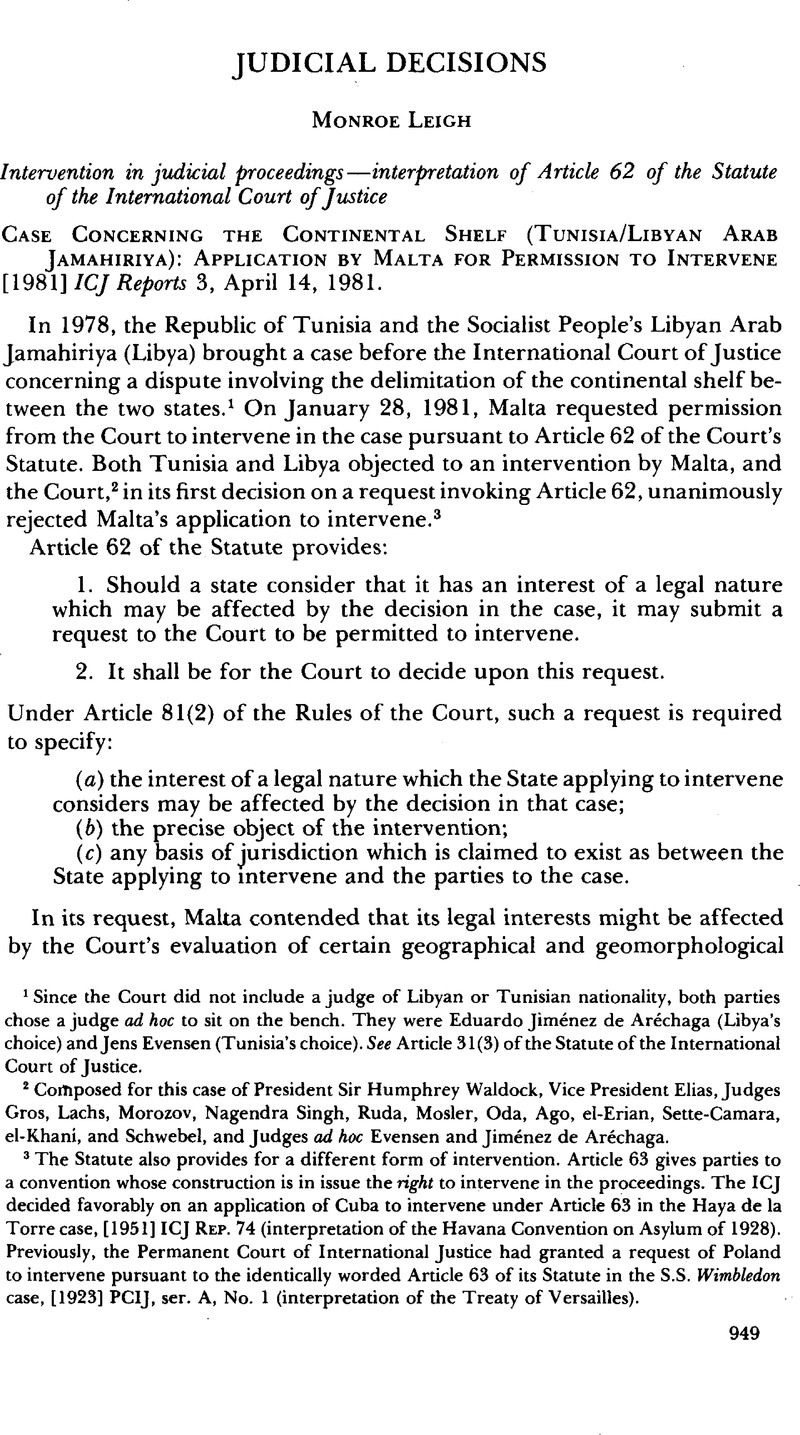No CrossRef data available.
Article contents
Case Concerning the Continental Shelf (Tunisia/Libyan Arab Jamahiriya): Application by Malta for Permission to Intervene
Published online by Cambridge University Press: 27 February 2017
Abstract

- Type
- Judicial Decisions
- Information
- Copyright
- Copyright © American Society of International Law 1981
References
1 Since the Court did not include a judge of Libyan or Tunisian nationality, both parties chose a judge ad hoc to sit on the bench. They were Eduardo Jimenez de Arechaga (Libya’schoice) and Jens Evensen (Tunisia’s choice). See Article 31(3) of the Statute of the InternationalCourt of Justice.
2 Composed for this case of President Sir Humphrey Waldock, Vice President Elias, Judges Gros, Lachs, Morozov, Nagendra Singh, Ruda, Mosler, Oda, Ago, el-Erian, Sette-Camara, el-Khani, and Schwebel, and Judges ad hoc Evensen and Jiménez de Aréchaga.
3 The Statute also provides for a different form of intervention. Article 63 gives parties to a convention whose construction is in issue the right to intervene in the proceedings. The ICJ decided favorably on an application of Cuba to intervene under Article 63 in the Haya de la Torre case, [1951] ICJ Rep. 74 (interpretation of the Havana Convention on Asylum of 1928). Previously, the Permanent Court of International Justice had granted a request of Poland to intervene pursuant to the identically worded Article 63 of its Statute in the S.S. Wimbledon case, [1923] PCIJ, ser. A, No. 1 (interpretation of the Treaty of Versailles).
4 Libya and Tunisia argued that Malta was interested in the reasoning of the Court, not in the actual decision; they contended that the term “decision” in Article 62 of the Court did not include the consideranda of the judgment.
5 Libya argued that the purpose of an intervention in contentious proceedings must amount to more than a mere submission of views. Tunisia argued that, in fact, Malta had already achieved its objective by the hearings on the question of intervention.
6 Libya and Tunisia argued that there existed no jurisdictional link in the present dispute between themselves and Malta. Malta denied the requirement for such jurisdictional nexuson the ground that it was not prescribed by the Statute and could thus not be imposed by the Court’s Rules.
7 See Article 62(2) of the Statute. The Court noted that it did not interpret paragraph 2 as a grant of unlimited discretion and felt bound to use its discretionary power only within the statutory framework.
8 Significantly, the Court noted that in the debates on the Rules of the Permanent Court of International Justice, whose sense the drafters of the present Statute did not intend to change, “it seems to have been assumed that a State permitted to intervene under Article 62 would become a ‘party’ to the case” (para. 24).
9 The Court also pointed out that had Malta sought permission to intervene as a party to the case, its jurisdictional link with Tunisia and Libya would have come into play. Libya and Tunisia suggested that Malta had narrowly circumscribed the purpose of the intervention to avoid the jurisdictional issue.
See Jessup, Intervention in the International Court, supra p. 903, for further discussion of this decision.


